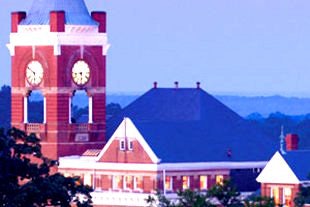 Winthrop University
Winthrop University
That was one of the key points made during a webinar Thursday titled “Preparing Principals: Lessons for Higher Education and Partner Districts.” The webinar was hosted by the American Association of Colleges for Teacher Education and meant to highlight a $75 million five-year grant program designed by The Wallace Foundation to improve the principal pipeline.
As a case in point, Mary Martin, Associate Professor within the College of Education at Winthrop University in South Carolina, detailed a selective principal preparation program developed through the grant in part by her college in conjunction with Charlotte-Mecklenburg Schools in North Carolina.
“We feel like we’re producing people that they are supporting and that they want to see lead in the coming years,” Martin said of the initiative, where candidates are admitted strictly by nomination from district officials.
Although as many as 60 candidates have been nominated and applied, only 25 are admitted to each cohort, Martin said.
“We know we’re getting the best and the brightest and that they’re eager to learn,” Martin said.
Charlotte-Mecklenburg Schools is among six urban districts chosen to share a $75 million Wallace Foundation grant to develop a pipeline of school leadership and measure its effect on student achievement. The grant was announced in 2011 and covers a period of five years.
The initiative involves 20 active partners, including several from the world of higher education.
One of the key objectives of the grant is to prepare principals who can improve instruction and effectuate school change, not just manage buildings, said Jody Spiro, Director of Education Leadership at The Wallace Foundation.
Research has shown that there is no shortage of certified school principals, Spiro said.
“The issue is: are there enough qualified principals and qualified candidates for the principalship so that there’s enough that a district can choose from so that the principal selected for a given school is the best match,” Spiro said.
At Winthrop, rather than being taught on campus, the principal classes are taught at a site within the Charlotte-Mecklenburg Schools, about a half hour or so from the university.
The classes are taught in two eight-week blocks per semester and focus on specific areas, such as supervision or curriculum. Candidates ultimately earn master’s degrees.
“Focusing on one thing is very beneficial because they are working full-time jobs and to focus on two sets of homework is just too much,” Martin said of the eight-week courses.
Faculty instruction is enhanced by school officials, such as administrators or attorneys for a school district, who may visit a class to speak about various situations that have confronted the district, Martin said.
The university asks the district to work with them to make sure class assignments are “problem-based.” For example, students must come up with school improvement plans.
Students also do internships that Martin says are carefully thought out.
“We no longer send a person out and say work alongside this principal and do a project,” Martin said. “But it’s a very special plan where interns are assigned to schools with strong principals that will guide them.”
As interns, students visit other schools that have different kinds of student populations.
“All interns get at least one experience in a high-needs school and one experience off the level that they normally teach,” Martin said.
Once candidates complete the program, Martin said, they are “well prepared” to work in a specific district, in this case, Charlotte-Mecklenburg Schools.
“We want to be the best provider we can be,” Martin said. She added that each college has something different to offer and that there is room for more than several colleges to serve the district.
While Martin spoke with confidence about the design of the partnership, she was less certain about how to evaluate sitting principals who’ve gone through the program.
“This is probably the area we struggle with the most,” Martin said. She explained that the university is starting to track data to see if student achievement continues to “move forward” upon a principal’s arrival.
“What we don’t want to see is a flat line or slip without some real explanation,” Martin said.
The university is also sending surveys out to the district to get a sense of how well the principals are doing. Districts, she said, are sharing performance ratings of principals to help the university see where they might be falling short.
In Prince George’s County Public Schools in Maryland, another Wallace grantee, officials are working to develop more formalized assessments of the performance of principals who’ve come through the Wallace principal pipeline program, according to Douglas Anthony, Associate Superintendent for Prince George’s County Public Schools.
Prince George’s County has partnered with the University of Maryland, Johns Hopkins University and The George Washington University. Anthony said one feature of the partnership is that principal candidates work on dissertations that are specific to problems within the Prince George’s County Public Schools.
The idea, he said, is to develop a principal prep program that is “mutually beneficial” to the school district and the partner university.















